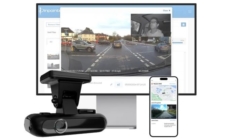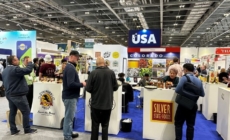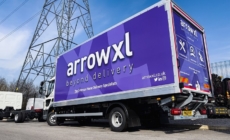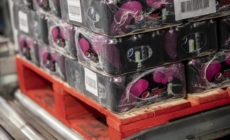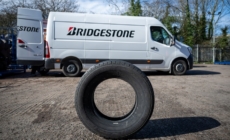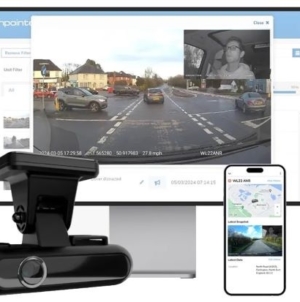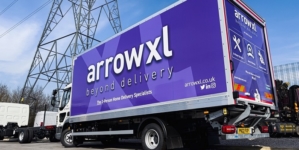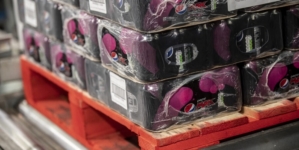-
PINPOINTERS ENHANCES FLEET AND VIDEO TELEMATICS OFFERING WITH LINK-UP WITH QUECLINK WIRELESS SOLUTIONS - 22 hours ago
-
BCMPA HELPS TO OPEN DOORS FOR US TRADE PARTNERSHIPS - 24 hours ago
-
ARROWXL SECURES FIFTH CONSECUTIVE GOLD ROSPA AWARD - April 19, 2024
-
Delivery management platform, Scurri topped over €12 billion in Gross Merchandise Value (GMV) in the total value of shipments processed in 2023 - April 17, 2024
-
Britvic reaffirms partnership with LPR - April 17, 2024
-
Kammac Supports Nimble’s Expansion into 500 Tesco Stores - April 5, 2024
-
Axiom Sustainability Software launches groundbreaking Social Value Calculator - April 4, 2024
-
Change to minimum wage and its impact on logistics - April 3, 2024
-
PARKSAFE GROUP TEAMS UP WITH QUECLINK WIRELESS SOLUTIONS IN FLEET TECHNOLOGY PARTNERSHIP - March 27, 2024
-
Facing shocking levels of violence at work – yet not paid enough to live on: 57% of UK retail staff say their wages barely cover basic expenses, despite many working more hours than ever - March 26, 2024
Supply chains of the future: sustainable logistics and profitability go together.
Comment by Huw Waters is product supply director for Procter & Gamble UK and Ireland.
Achieving sustainable logistics does not mean sacrificing profits. For P&G, retail partners and consumers, it’s a win-win-win scenario
P&G rail
By redesigning its network and establishing green corridors between major logistics locations, P&G is delivering fewer and friendlier distribution miles in Western Europe.
Too often in the past sustainability has been viewed as a cost to a business. People have seen investing in sustainable technologies and innovating to reduce their environmental impact as a hit on their bottom line. This isn’t the case. Sustainability drives efficiency – and this is particularly true in supply chain logistics. You don’t have to sacrifice profitability to achieve sustainable logistics; the two go hand-in-hand.
Reaching this vision, however, requires a degree of humility. We need to accept that no company can do it alone. Partnerships and broad collaborations are crucial to solving the greatest environmental challenges we face as businesses.
Since 2002, P&G has more than halved the impact it has on the environment across energy usage, CO2 emissions, waste disposal and water usage. These operational results have led to nearly $1bn in cost savings, representing an important contribution to our bottom line. Crucially, the benefits of supply chain efficiency aren’t restricted to us. We see sustainable supply chains as a win-win-winscenario. P&G benefits through our cost-savings; our retail partners benefit through savings we can share with them and the faster, more accurate flow of products they receive; and our consumers benefit from savings we can pass on to them. All of this comes on top of the massive difference it makes to our industry’s total impact on the environment.
This win-win-win dynamic means our work on sustainable supply chains isn’t a difficult sell with our partners. We see ever-increasing levels of collaboration across our industry on sustainable logistics and we’re very fortunate that UK and European retailers are leading the way in this field with their global counterparts.
In 2007, P&G set a target for 2015 to reduce road kilometres travelled by trucks by 30%. Across all Western Europe we have already achieved this target through our new approach to intermodal transport. By redesigning our network and establishing green corridors between P&G’s major logistics locations, we’re delivering fewer and friendlier distribution miles in Western Europe. We have transport collaboration programmes with all our major retail partners. We’re bringing distribution centres closer to the customer and we’re moving from truck to rail and inland shipping, which is eight times less carbon intensive. This represents 80,000 less journeys by road per year. Beyond cutting the number of trucks on the road, we’re also working to ensure the remaining trucks are full – in both directions.
The key is collaboration. Working with retail partners and logistics suppliers to achieve real progress by removing, not transferring, costs and complexity behind the scenes. If we understand the priorities on both sides, we can make sustainable commitments and investments towards a joint vision, and we can make decisions along the way much faster. It also helps bring the balance needed between short-term demands and long-term aspirations.
For retailers that partner with us on this, we’re faster, smoother, more efficient and less cost intensive than ever before. We all know our industry, our businesses, and our supply chains are a race. The digitizers are in the lead, synchronized and integrated partnerships are the future, and embracing a digital supply chain is the only way to stay relevant.
Sustainability is both a responsibility and an opportunity to secure the future of our businesses and society. We need to embrace a ‘do and learn’ mindset and be willing to invest now for future gain—it is good supply chains and good business. There is no compromise between sustainable logistics and sustainable profitability, so no argument not to do it. First published here: www.theguardian.com/sustainable-business/supply-chain-future-sustainable-logistics-profit


